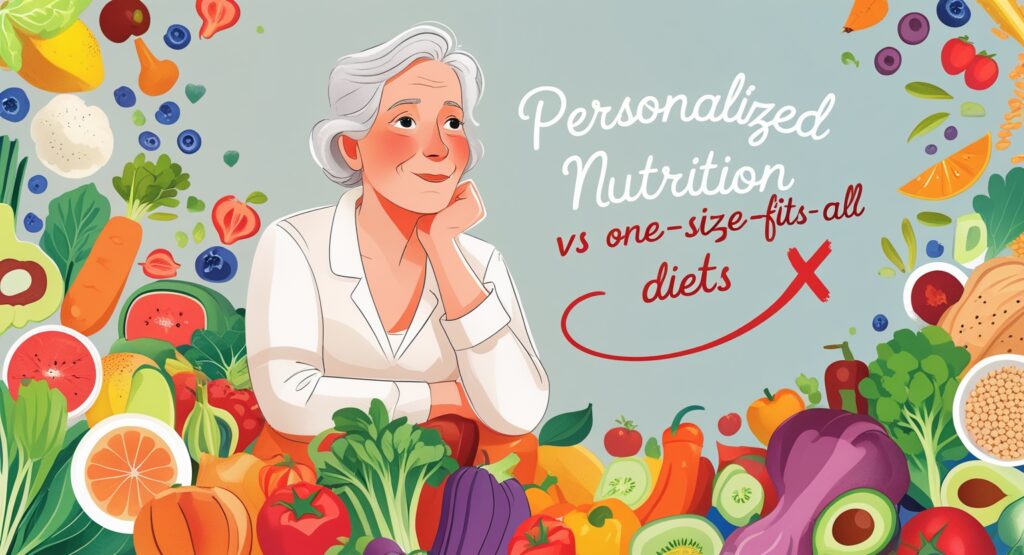Turning 40 is a milestone that brings both rewards and challenges. One of the biggest challenges is maintaining your health, especially when it comes to managing weight. What worked in your 20s and 30s might no longer be effective. That’s where the debate begins between personalized nutrition and one-size-fits-all diets. Which option leads to better results and lasting change?
Let’s explore the differences and why understanding your body on a deeper level matters more than ever.
What Is Personalized Nutrition?
Personalized nutrition is all about creating a diet that fits your unique needs. It considers your age, gender, genetics, lifestyle, and any health concerns such as hormone imbalances or low energy. With tools like food sensitivity testing and functional lab work, including hormone or GI panels, a custom plan can be built specifically for you.
On the other hand, one-size-fits-all diets take a general approach. They don’t factor in personal differences, which makes them less effective—especially for people facing midlife challenges like fatigue, gut issues, or hormonal changes.
Why Dieting After 40 Is Different
Once you hit your 40s, your body starts to change. Hormones like estrogen, testosterone, and cortisol fluctuate, affecting everything from metabolism to weight distribution. Women may notice increased belly fat, while men often experience changes related to testosterone levels.
Here’s what makes midlife nutrition more complex:
- Metabolism slows down, making it harder to lose weight
- Hormonal shifts can lead to fatigue, bloating, and stubborn weight gain
- Gut health becomes more important for digestion, immunity, and mood
Because of these changes, generic diet plans often fall short.
The Benefits of Personalized Nutrition
- Addresses Root Causes
Personalized nutrition goes deeper than calories and macronutrients. It helps identify specific triggers like food sensitivities or inflammatory foods that may be contributing to weight gain or poor digestion. This insight allows you to make targeted, effective changes. - Supports Hormonal Balance
A well-designed plan can help stabilize blood sugar and support hormone detox pathways. This can ease symptoms like mood swings, fatigue, and bloating, especially for women over 35. - Improves Gut Health
Since gut health plays a major role in energy, metabolism, and immune response, a personalized plan may include detox strategies or cleanse programs designed to restore balance in your digestive system. - Encourages Long-Term Success
Unlike restrictive, short-term diets, a personalized plan fits your lifestyle and preferences, making it easier to maintain in the long run.
Why One-Size-Fits-All Diets Don’t Work for Everyone
Diets like keto, paleo, or intermittent fasting might offer quick results, but they don’t consider your individual health history or hormonal profile. This makes them a poor fit for many people in midlife.
Here’s why they often fail:
- They overlook differences in genetics and metabolism
- They ignore how midlife hormonal shifts impact weight and energy
- They focus on surface-level symptoms rather than root causes
Without customization, these plans can cause frustration or even worsen symptoms.
How to Get Started With Personalized Nutrition
If you’re ready to switch to a personalized approach, here are a few essential steps:
Functional Lab Testing
Start with blood panels and hormone testing to uncover any imbalances that may be blocking your progress.
Food Sensitivity Testing
Identifying which foods your body doesn’t tolerate well can lead to significant improvements in energy, digestion, and weight management.
Supplement Support
Supplements designed for midlife wellness, such as those supporting hormone balance or energy, can help bridge nutritional gaps.
Professional Guidance
Working with a certified health coach or practitioner can give you the structure and accountability you need to stay on track. Choose someone with proven experience and real success stories in hormone-related weight loss and wellness.
What to Focus On
As you transition into a more tailored nutrition plan, keep these areas in mind:
- Hormonal Health: Choose foods that support balance and blood sugar regulation
- Gut Health: Improve digestion and reduce symptoms like bloating and fatigue
- Lifestyle: Use stress management techniques to regulate cortisol
- Testing: Use real data to guide your choices and monitor your progress
Final Thoughts
One-size-fits-all diets may work temporarily, but they rarely offer the depth of support needed after 40. Personalized nutrition takes into account the unique changes your body is going through and helps you address real challenges like fatigue, belly fat, and hormone fluctuations.
At Leap 2 Better Health, we create customized wellness plans that help you regain control of your health and energy. Whether you’re struggling with gut issues, hormonal changes, or chronic fatigue, we’re here to guide you toward long-term results.
Time to Take the Next Step
Ready to experience the benefits of a personalized approach? Book your free 30-minute consultation today and take the first step toward better health.
👉 Click here to begin your transformation with Leap 2 Better Health





